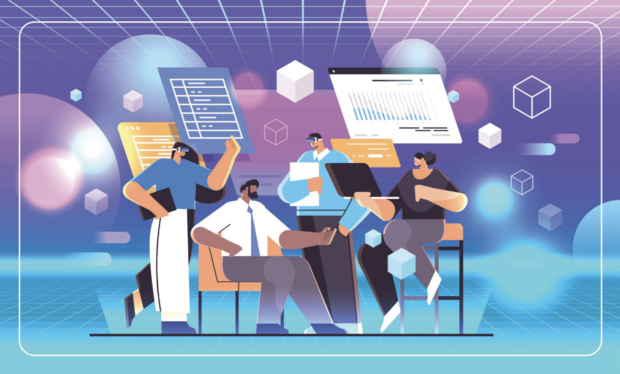The skills developed through gaming will give many young leaders an advantage in the workplaces of the future. Here’s why.
“It is better to be surprised by a simulation than blindsided by reality.”
Futurists Stuart Candy and Jake Dunagan
The workplace is changing – and so too is the workforce. Many digital natives and cross reality (XR) natives – respectively, those aged 27 or younger and 17 or younger in 2023 – are already skilled in using the digital interfaces that are built into video-gaming platforms. When they play games, they create their own worlds and develop social networks. As they do so, they are preparing themselves for the office of the future.
These digital and XR natives will have a competitive advantage in the workplace, because gaming can be an excellent way to practise for the future in low-risk ways.
The power of games
Games are stories to help us make some sense of the puzzling world that’s all around us. Games can help us to connect with others in the processes of reconstructing the past or imagining a future, using verbal and visual language capabilities. Gamers fill these mental-made worlds with the fictional narratives they call identities. They play games of aspiration, decision, action and learning, expanding their connections with new stories. Well-designed games bubble with emotion and demand player attention, just like well-written stories. In a game, however, you get to be in the story.
Thinking ‘futureback’ – we recommend thinking ten years into the future and working back to the present – leaders will need a game designer’s heart if they wish to attract, engage and retain young people seeking meaningful work. Young people will be seeking harmony between themselves and their work. Expectations will be high. Leaders will need to provide opportunities for them to be in good company with others, through an increasingly wide range of digital media.
The future will be an incessant carnival of surprises that will be intensified by a new generation of gamers entering the ‘officeverse’ – the anytime, anyplace world of where we will work, when we will work, and how we will work.
Shaped by games
As philosopher Marshall McLuhan said, “We shape our tools, and thereafter our tools shape us.” While many of today’s video games are overly violent and sexual, thinking futureback reveals that what we call video gaming today will become one of the most powerful learning mediums history has seen. Gaming will evolve from mostly recreational to a powerful medium for social engagement.
The mechanics and principles of games will be integrated in how we work, in multiple ways. Gameful cooperation will enable us to experiment with co-creating impossible futures. Accelerated by a new generation of gamers growing into leadership positions, gameful literacy – that is, fluency with gaming ideas – will influence ways of collaborating and organizing in every industry. Whether online or face-to-face, gaming will redefine how we connect and what we do together, which will redefine the future of an organization.
The player networks in the book and movie, Ready Player One, show how a complex and messy assembly of players can call gaming networks their social home. Whether in a massively multiplayer online roleplaying game like League of Legends, a multiplayer online battle arena like Fortnite, or a sandbox game without boundaries like Minecraft, these places force players to create squads, sports teams and parties that cooperate. Driven by an intent to win, such player networks increasingly resemble purpose-driven organizations.
In the world of gaming, agile cohorts can be built rapidly to create pop-up communities centred around core values. To encourage a positive culture, many gaming companies have codes of conduct that encourage positive behaviours and discourage bullying or destructive playing. Most have a stated goal of providing an inclusive gaming environment where players can have fun while feeling safe and respected. The parallels to organizations are clear.
Experiencing the impossible
The future officeverse will be an archipelago of places, spaces and possibilities. In the officeverse, technology will empower multiple identities and we will be able to write our own stories. Players will try out jobs and discover what they like and don’t like, learning how to be brave in low-risk ways. We can experience working for robots, like in the popular virtual reality (VR) game Job Simulator. Simulations and games allow people to be inside their scenarios, and to practise leadership.
Leaders can also use scenarios and gaming to probe impossible futures and focus on the importance of surprise. As you think futureback about offices and officing, ask: “How can we prepare ourselves to be surprised and hone our agility?” Scenarios, simulations and games allow us to prepare to be surprised – to think the unthinkable. They enable us to experience impossible futures before they become possible.
Think of the way that simulations are already being increasingly used for skills training and to encourage lifelong learning. VR simulations prepare members of fire and rescue services to safely fight fires and rescue endangered citizens, including learning resuscitation techniques. Cybersecurity simulation training is used to test how organizations would respond to cyberattacks. In Mountain View, California, the police department applies state-of-the-art neuroscience research to a combination of VR and biometric devices to give officers means to improve the ways that they respond to calls. We call this voluntary fear exposure, which allows you to practise handling simulated dangers in low-risk ways.
Gameful engagement will empower profound learning experiences. From prototyping store designs to troubleshooting industrial systems to training on-the-ground workers, engaging in this playground will trigger neuroplasticity at a scale never before possible. Gaming will be the preferred medium for building agile mindsets and organizations. And today’s young gamers will be more future-ready than the rest of us.
Bob Johansen, Joseph Press and Christine Bullen are all part of Institute for the Future and co-authors of Office Shock: Creating Better Futures for Working and Living (Berrett-Koehler).

